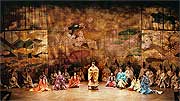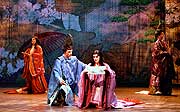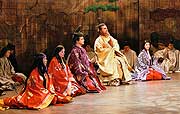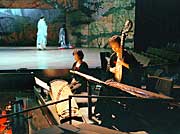 Minoru Miki Opera Minoru Miki Opera
|
| The World Premiere of “The Tale of Genji” |
|
The world premiere of my seventh opera “ The Tale of Genji
” has done well on June 15 in Saint Louis, U.S.A. The Opera theatre
of Saint Louis performed the opera also on the 17, 21,23, 25 of
June. At every performance, we received a full standing ovation.
The data of the world premiere of “The Tale of Genji” are following: |
| |
Opera in two acts, sung in English
Music by Minoru Miki
Original story and libretto by Colin Graham
Adopted from the book by Lady Murasaki Shikibu
Commissioned by Opera Theatre of Saint Louis
General Director , Charles Mackay
June 15,17,21,23,25 |
| |
| Conductor |
Steuart Bedford |
| Stage Director |
Colin Graham |
| Scenic and Costume designer |
Setsu Asakura |
| Choreographer |
Kikushiro Onoe |
| Associate Designers |
Jun Matsuno
Robin VerHage-Abrams |
| Lighting Designer |
Christopher Akerlind |
| Wig and Make-up Designer |
Tom Watson |
| Stage Manager |
Gretchen Mueller |
| Associate Director |
Tim Ocel |
| Assistant to the Director and Choreographer |
|
Eda Holmes |
| Chorus Master |
Cary John Franklin |
| ranslator/Interpreter |
Yoshimi Fukuzawa |
|
| |
| Genji |
Mel Ulrich |
| Old Emperor/Recluse |
Andrew Wentzel |
| To-no-Chujo |
Richard Troxell |
| Fujitsubo/Murasaki |
Elisabeth Comeaux |
| Rokujo/Lady of Akashi |
Cheryl Evans |
| Shonagon/Kokiden |
Josepha Gayer |
| Aoi |
Jessica Miller |
| Suzaku |
Carleton Chambers |
| Koremitsu |
Eric Jordan |
Chorus |
Opera Theatre Ensemble |
Pipa /Qin solo |
Yang Jing |
| 21-string Koto solo |
Reiko Kimura |
Members of the St. Louis Symphony Orchestra
Hans Vonk, Music Director and Conductor |
|
|
Now I would like to reflect and tell you about the rehearsals
for the premiere.
Since the earliest music rehearsal on May 8, I had some anxiety
about the vocal lines. Because I am a foreigner who does not usually
speak English. Although I have already composed two former operas
in English “An Actor’s Revenge”(1979) and “Joruri”(1985).
This time I tried to express some ancient feeling of the Japanese
Court around 10th to 11th Century in English. After the music
rehearsal, several main singers like Mel, Elisabeth and Josepha
expressed their deep love of singing my melodies and showed genuine
surprise at its variety. Mel said that he was hearing my melodies
always, even in his dreams, he formally only has these experiences
with Mozart. I felt very honored, and could feel the success of
the opera.
Then we went ahead to overcome problems and difficulties one
by one in the rehearsals. Such as with the staging(moving), orchestra
rehearsals, scenery, costumes, lightning, and so forth.
I’d like to tell you about whole opera more, but here, let
me introduce the musical aspects.
Half a month before the first performance, I let singing free;
they started learning score before music rehearsal, so can do
their own ways. However, it takes a little time for orchestra
members to understand my special writing. In parallel with orchestra
rehearsals, on June 4th, we also started to practice on stage
using the piano. Thanks to starting to practice at the theatre
so fast I realized important problems, which we otherwise would
not have been able to overcome for this coming performance. For
instance, it is hard to show the chorus’s incantation scene when
Aoi died. The functions of this theater were not fit to do that.
Of course Colin knew theatre’s function so much that he didn’t
write visual chorus scene in his libretto. I only imagined a primitive
incantation here, and write in the score a chorus music with variable
rhythmic patterns to change total music atmosphere to prepare
the appearance of Rokujo’s live spirit. I had a slight hope to
see its violent effect at least by shadows of chorus and fire.
But after watching theatre function, I made me consent to give
up my hope and brought it to future chances.
The other problem was so many doubling roles. I knew several
examples of one doubling roles which show very effective for drama.
But in this production, four important soloists play eight roles!
I wondered if the audience could recognize who is who. However,
each soloist enjoyed each roles, and even played them quite well
in different sense.
From the beginning, I knew the opera was too long for the world
premiere. To economize on total duration of production, Colin
and I set the opera as two acts (my ideal thought was an opera
in three acts). We also cut many optional places with getting
Steuart’s idea. He conducted the world premiere of “An Actor’s
Revenge” in London in 1979. He has special talent to understand
scores. One year ago, he sung to Colin all the vocal lines of
this opera with his own piano accompaniment Then they sent me
mails with much thanks for my composition.
However, even after much cutting, Act I needed almost one and
a half hours. I thought we will have to divide the opera into
three acts on the next occasion. The original story of “The Tale
of Genji” is consisted of many loves talking in the court, and
the Heian era was a very calm age. Colin and I gave the opera
several dynamic and fast scenes, but to keep the mode of the original
story and Heian era, I needed to set calm and moderate paces,
for example Gagaku music. In general I believe that people loved
this atmosphere and could concentrate on the drama. My anxiety
was that they would concentrate too much on Act I, and as a result
become feel difficulty to appreciate Act II physically without
knowing it.
By the way, in March, tickets for the performance on the first
day and second day were already sold out. I did not have any worries
about the number of the audience. I am so lucky and appreciate
all the guests who bought those tickets. Besides this, OTSL’s
supporters came to see the opera one after another and always
just praised it. This made my heart relaxed.
On the day for the first orchestra dress rehearsal, Colin said
to me, “ Finally, the time is coming. It is hard to make myself
calm down.” He experienced directing four hundred productions,
and this is his fifty – fifth premiere of a new opera. If such
a great director felt like that, it is natural that the singers
were nervous, too.
The stage of this theater projects to the audience seats. Also,
the orchestra pit is under the stage, and open only half way to
the audience. The only difficulty is the balance of the orchestra
itself.
Even though we still had some problems, I was quite calm. Why
so calm? I was wondering if I was satisfied with expressing all
that I needed to in the full score. It took ten years from when
I began to plan this opera, and three years for composing. Also,
I do strongly believe in the success of this performance because
of great efforts by the staff, cast and musicians and a good response
from them.
The opera, “ The Tale of Genji ” started with a piccolo like
Japanese Ryuteki in Gagaku music in a Court scene, where is much
far away from Japan. This opera would change the thousand year
history of The Tale of Genji. We got a much stronger orchestra
sound than they did in the dress rehearsal. Now I will tell you
the construction of the opera according to its order.
The chorus of courts guided the Emperor Kiritsubo. He confessed
his past life and informed Fujitsubo, Genji (Shining one), Kokiden,
Suzaku, and Aoi. There are painted scrolls behind them that Ms.
Setsu Asakura beautifully designed. Then, the Pipa plays the dramatic
theme for the living spirit of princess Rokujo. This theme plays
one of the most important roles in the opera. Following, the various
episodes related to Genji start.
A forbidden love duet sung by Genji and Fujitsubo, the depression
of Princess Rokujyo, a humorous aria by To-no-Chujo, and finally
the aria “It Is Always One I See” sung by Genji which indicates
his expectation to meet Murasaki, and took the audience into a
fantasy world.
Like the following scene when Genji suffered from continuous
nightmares, it is no doubt that not everyone loves our opera In
the past, whenever people tried to make a drama using this difficult
theme, The Tale of Genji, the results were almost always not successful.
I often met inconsiderate criticisms. During performances of this
opera, however I felt an unbelievable tension from most of the
audience which was concentrating on the drama and music. “The
Autumn Festival” with Bugaku dance choreographed by Kikushiro
Onoe, the peaceful relationship between Genji and Murasaki through
koto lesson, the appearance of the living spirit of Princess Rokujo,
the scene when Kokiden uses scandals Genji has caused and exile
him to a distant and lonely shore at Suma, the storms there and
sailing to Akashi, the love between the Lady of Akashi and Genji,
the farewell letter from Fujitsubo, the death of Murasaki by a
dead spirit, and the last pathetic aria sung by Genji. Then we
returned at plain stage of the Heian Court.
My operas seem to be rare. They are not the same as the operas
created in the twentieth Century which did not make singers delighted.
If singers are accustomed my operas, they are sure to be satisfied
with the well-singing melodies. On the other hand, quite different
from usual operas I have developed many new instrumental aspects
in my own way. Specially many Asian traditional solo instrumentalists
seems to recognized their ability through my operas. I am so happy
to introduce their tremendous musicality and technique not only
for the listeners of ethnic music but also for the world opera
goers. In case of Genji, Yang Jing and Reiko Kimura praised very
much from all persons including every reviews.
At each performance, I was surprised to feel stronger music
than the previous performance. This feeling was very new in my
long experience of my opera productions. When I saw the last performance,
I realized the power of the opera was almost two times that of
the premiere evening.
After the curtain call on the premiere performance, Colin,
Steuart, and I met back stage, and moved to hug each other with
a feeling of “ Triumph! ” Then we were at the reception on the
huge lawn, under a clear sky and a round smiling moon. I was sure
the opera, The Tale of Genji, would make the dreams of the audience,
who need beauty and drama, come true by being surrounded by various
people.
Now I am profoundly grateful to Colin Graham who wrote the
libretto and directed the opera, Charles Mackay and the Opera
Theatre of Saint Louis, St. Louis Symphony Orchestra, many American
supporters, and the friendly audience, including one hundred Japanese
supporters who came to Saint Louis from Japan just to attend our
performances.
The Nissei Theatre in Tokyo decided to invite Opera Theatre
of Saint Louis to hold the Japanese premiere of “The Tale of Genji”
in September 2001. In 1988 the Nissei Theatre invited OTSL and
had the Japanese premiere of my third opera “Joruri” successfully.
Just same of that time, “The Tale of Genji” will be sung in English,
but on a little bit bigger scale than the world premiere. We are
thinking to change several things according to the theatre’s function
and circumstance. The opera will be remake into three acts, and
become more acceptable by audiences. |
|




